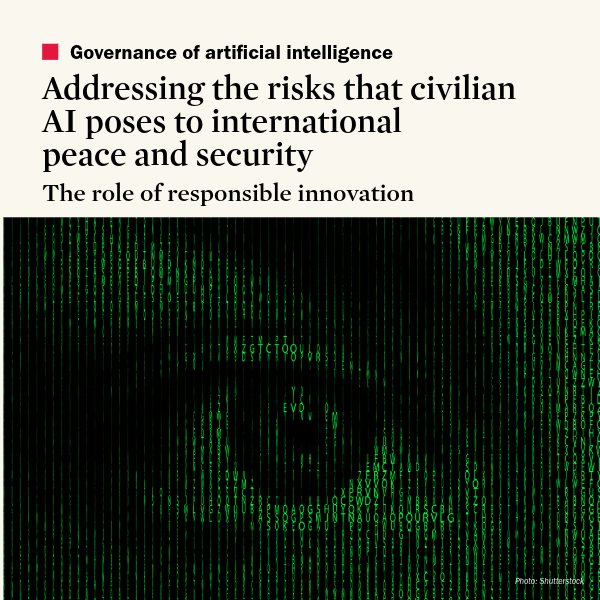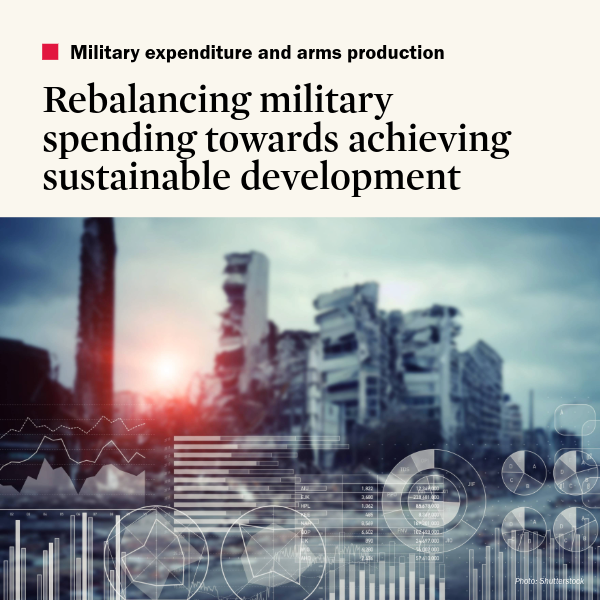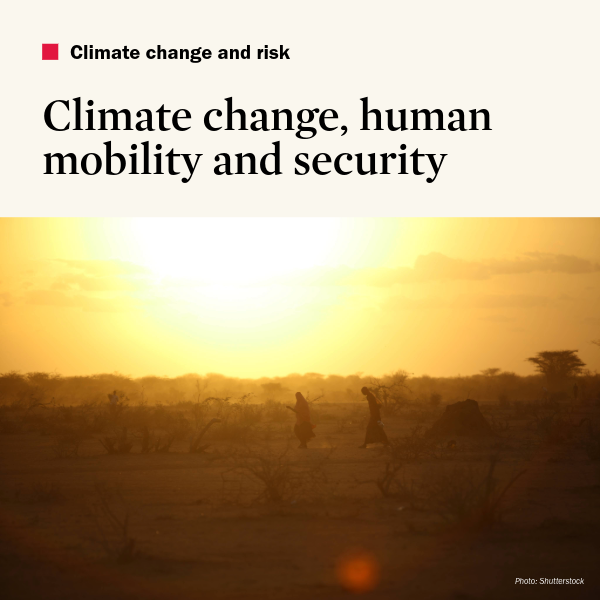 |
| |
|
News | Events | Commentaries | Publications | Vacancies
|
News and recent events
|
 |
SIPRI leads two side events at UN First Committee
In October, SIPRI led two side events at the United Nations First Committee in New York. The first event focused on the legal and humanitarian implications of bias in military artificial intelligence (AI). Co-organized with the Permanent Mission of Germany to the UN, the event featured Dr Marta Bo, Dustin Lewis, SIPRI Associate Senior Researchers, and Laura Bruun, SIPRI Researcher, who presented key findings from a recent SIPRI report on the topic. The second event, held jointly with the Netherlands and Switzerland, marked the launch of a new SIPRI report ‘Towards Multilateral Policy on Autonomous Weapon Systems’. The report’s author, Dr Alexander Blanchard, shared insights from the publication.
Read more | Read the report on bias in military AI | Read the report on multilateral policy on autonomous weapons
|
|
 |
SIPRI expert delivers keynote at EU research security conference
SIPRI expert Lauriane Héau delivered a keynote at the ‘European Flagship Conference on Research Security’ in Brussels. Her address explored the relationship between export controls and research security, highlighting key differences and similarities, and possible ways that synergies could be developed and utilized to manage interactions between the two instruments both at the policy and the practitioner level.
Read more
|
|
 |
SIPRI hosts workshops on transparency and security in the Western Balkans
SIPRI hosted two workshops as part of the project ‘Empowering journalism transparency in defence spending and arms procurement in the Western Balkans’, funded by the Swedish Institute. During the workshops, participants discussed challenges and best practices related to investigating defence spending, arms procurement and regional security cooperation. SIPRI provided training to the groups on how to monitor defence spending and arms procurement trends.
Read more
|
|
 |
SIPRI and WWF host discussion on wetland restoration in Ukraine and wider Baltic Sea region
SIPRI, in partnership with the World Wide Fund for Nature, hosted a roundtable discussion titled ‘Refilling the swamp: Wetland restoration as a nature-based approach to security and resilience building in Ukraine and the wider Baltic Sea region’. The roundtable convened key stakeholders to discuss the strategic rationale, practical challenges and policy pathways for using wetlands as defensive infrastructure in Nordic and Baltic countries.
Read more
|
|
 |
SIPRI hosts webinar on future of multilateral policy on autonomous weapon systems
SIPRI hosted a public webinar on possible directions for multilateral policy on autonomous weapon systems. The discussion centred on findings from a new SIPRI report on this topic ‘Towards Multilateral Policy on Autonomous Weapon Systems’. SIPRI’s new report equips policymakers with a structured and realistic overview of possible next steps to assist them to advance multilateral policy efforts. Report authors Dr Alexander Blanchard and Netta Goussac discussed their findings and recommendations during the event.
Read more | Read the report
|
|
 |
SIPRI co-hosts event on maritime security dynamics in the Arctic
SIPRI and the French Embassy in Sweden co-hosted a roundtable discussion on the evolving security dynamics in the Arctic. The event, titled ‘Naval challenges in the Arctic: French and Swedish perspectives’, examined how Russia and its growing military presence in the Arctic have affected the North Atlantic Treaty Organization (NATO) and European security, as well as the broader implications of Russia’s full-scale invasion of Ukraine for northern defence cooperation.
Read more
|
|
|
Upcoming events
|
From ashes to insight: 80 Years after Hiroshima and Nagasaki
1 December 2025
The year 2025 marks 80 years since the atomic bombings of the Japanese cities of Hiroshima and Nagasaki, where approximately 200 000 people lost their lives. Today, the nuclear threat is higher than it has been in decades, and global nuclear arsenals are once again expanding. The Alva Myrdal Centre for Nuclear Disarmament, Swedish Physicians Against Nuclear Weapons and SIPRI are jointly hosting a discussion on these questions.
Read more | Register
|
|
Intensive online course on evolving challenges of WMD non-proliferation and disarmament
20–23 January 2026
SIPRI and the EU Non-Proliferation and Disarmament Consortium (EUNPDC) are pleased to announce an intensive online course on the impact of contemporary geopolitical challenges and novel technologies on the proliferation, development and risk of use of weapons of mass destruction (WMD) and mechanisms to address these, including towards arms control and disarmament. Graduate and postgraduate students in technical or natural science disciplines, as well as early-career professionals in relevant fields, are encouraged to apply.
Read more
|
|
|
|
|
 |
SIPRI experts were recently featured in these external outlets:
- ‘Latin America: A test case for aligning climate action, food security and social sustainability’, Dr Caroline Delgado, Siani, 19 November 2025.
- ‘Making water knowledge with artificial intelligence: A qualitative study of expert interviews on water diplomacy’, Dr Kyungmee Kim and Abeer S. Ahmad, Ambio, 14 November 2025.
- ‘Latin America: A test case for aligning climate action, food security and social sustainability’, Dr Caroline Delgado, IPS News, 14 November 2025.
- ‘The Nordics: Deterring Russia, preserving the transatlantic link’, Dr Barbara Kunz and Aino Esser, The Tipping Point: An Emerging Model of European Security With Ukraine and Without Russia by the German Institute for International and Security Affairs, 6 November 2025.
- ‘Climate change is here to stay. So are armed groups. Ahead of COP30, here’s why that matters…’, Kheira Tarif (interviewee), The New Humanitarian, 4 November 2025.
- ‘Here are the questions Palestinians must confront today to shape their future’, Dr Alaa Tartir, Middle East Eye, 30 October 2025.
|
|
|
Publications
|
 |
Addressing the Risks that Civilian AI Poses to International Peace and Security: The Role of Responsible Innovation
For years, the discussion around AI and international peace and security has centred almost exclusively on military applications, such as autonomous weapons systems. However, advances in civilian AI could also undermine international peace and security in many ways. This report explores the risks that advances in AI in the civilian domain could present to international peace and security, and how such risks can be addressed through responsible innovation.
Read the report
|
|
 |
Rebalancing Military Spending Towards Achieving Sustainable Development
Amid a deteriorating global security environment, world military expenditure reached US$2.7 trillion in 2024. This surge coincided with faltering progress on reaching the UN Sustainable Development Goals. A state’s spending on the military can have substantial adverse impacts on its sustainable development—such as diverting resources from social expenditure, slowing economic growth, increasing inequality and contributing to climate change through greenhouse gas emissions.
Read the SIPRI Research Policy Paper
|
|
 |
Climate Change, Human Mobility and Security
This SIPRI Policy Brief explores the connected challenges of climate change, human mobility and security, highlighting how fragmented policies and misconceptions—such as the myth of mass climate migration—hinder effective responses. To address this, the policy brief calls for safe, rights-based migration that facilitates climate adaptation; support for the most vulnerable, immobile populations; and people-led, democratic climate action.
Read the SIPRI Policy Brief
|
|
|
|
|
Vacancies
|
|
|
|
|
|
Accurate, dependable information is more important than ever. Invest in the facts.
Support SIPRI
|
|
 |
| SIPRI is an independent international institute dedicated to research into conflict, armaments, arms control and disarmament. Established in 1966, SIPRI provides data, analysis and recommendations, based on open sources, to policymakers, researchers, media and the interested public. |
|
|